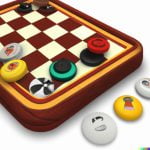Strategy board games have always been a favorite pastime for many, offering a unique blend of entertainment and mental stimulation. For beginners looking to dive into the world of strategy board games, there are numerous options available that cater to all skill levels. In this article, we will explore some of the top strategy board games for beginners, perfect for those new to the genre.
Whether you are looking to improve your cognitive skills, enhance strategic thinking, or simply enjoy some quality time with friends and family, strategy board games offer a range of benefits. Not only do they provide an opportunity to exercise your brain through challenging gameplay, but they also encourage social interaction and communication among players. These games serve as a great way to unwind, learn new tactics, and develop critical thinking skills in a fun and engaging way.
From classics like Settlers of Catan and Stratego to modern favorites like Ticket to Ride and Pandemic, beginner-friendly strategy board games come in various themes and mechanics to suit different preferences. Whether you prefer competitive play or cooperative challenges, there is a game out there waiting for you to explore its strategic depths. So grab your friends or family members, set up the game board, and get ready for an exciting journey into the world of strategy gaming.
Benefits of Playing Strategy Board Games for Beginners
Playing strategy board games can offer a multitude of benefits for beginners, beyond just having a fun time. One of the key advantages is the improvement of cognitive skills that comes with playing these types of games.
From critical thinking and problem-solving to spatial awareness and decision-making, engaging in strategy board games can help sharpen these skills in an entertaining way. By thinking ahead, analyzing different scenarios, and adapting strategies on the fly, players can exercise their brains and enhance their mental capabilities.
Moreover, strategy board games also provide opportunities for social interaction, making them perfect for gatherings with friends or family. Whether it’s collaborating with teammates in cooperative games or competing against each other in competitive ones, these games foster communication and teamwork.
Building relationships through shared experiences and friendly rivalries can create lasting memories and strengthen bonds between players. In a world dominated by digital screens, sitting down at a table with a physical board game can facilitate face-to-face interactions and create meaningful connections.
To experience the benefits of cognitive skill improvement and social interaction that come with playing strategy board games as a beginner, exploring some of the top titles in this genre is essential. Here are some recommendations to kickstart your journey into the world of tabletop gaming:
- Settlers of Catan: Known for its resource management mechanics and dynamic gameplay, this game is a great entry point for beginners looking to dive into strategy.
- Ticket to Ride: With its accessible rules and strategic depth, this game offers a perfect balance for new players seeking a challenge.
- Carcassonne: Delving into tile placement strategies, this game introduces beginners to the fundamental concepts of spatial planning and area control.
By immersing yourself in these top strategy board games for beginners, you can enjoy not only hours of entertainment but also an array of cognitive benefits and social interactions that come with tabletop gaming.
Settlers of Catan
Why Settlers of Catan Is Ideal for Beginners
One of the reasons why Settlers of Catan is considered one of the top strategy board games for beginners is its simple yet engaging mechanics. The game can be learned in just a few minutes, making it accessible to new players who may not have much experience with strategy games. Additionally, Settlers of Catan encourages critical thinking, resource management, and negotiation skills without overwhelming players with complex rules or strategies.
Tips for Beginners
For beginners looking to dive into the world of Settlers of Catan and other strategy board games, it’s important to start by familiarizing yourself with the rules and basic strategies. Understanding how to efficiently collect and trade resources, expand your settlements strategically, and adapt your gameplay based on your opponents’ moves can greatly improve your chances of success in the game.
Don’t be afraid to experiment with different tactics and approaches to see what works best for you – after all, half the fun of playing strategy board games is discovering new ways to outsmart your opponents.
Ticket to Ride
One of the key elements that make Ticket to Ride perfect for beginners is its straightforward ruleset. Players collect colored train cards and use them to claim routes on the game board, aiming to connect cities and fulfill destination tickets for additional points. The mechanics are easy to grasp, making it accessible for new players while still offering depth and strategy for more experienced gamers.
Here are some reasons why Ticket to Ride deserves a spot on the list of top strategy board games for beginners:
- It encourages forward planning and decision-making.
- Players must balance short-term goals with long-term strategies.
- There is an element of competition, but also opportunities for collaboration.
Overall, Ticket to Ride provides an excellent introduction to strategy board games, offering a blend of accessibility and depth that appeals to both new and seasoned gamers alike. Its engaging gameplay, strategic decision-making, and fun mechanics make it a must-have for anyone looking to expand their board game collection with one of the top strategy board games for beginners.
Carcassonne
One of the key appeals of Carcassonne for beginners is its mix of luck and strategy, providing an opportunity for players to learn how to adapt their plans based on the tiles drawn during each turn. This balance makes the game approachable for those new to strategic thinking while still offering enough depth to keep players challenged and engaged.
As players build their own sections of the landscape while strategically blocking their opponents’ progress, they begin to understand the importance of planning ahead and making calculated moves.
Moreover, Carcassonne promotes social interaction among players as they compete to claim features on the board and score points. Beginners can learn how to negotiate with others, form temporary alliances, or strategize against common adversaries. These interpersonal skills add another layer of enjoyment to the gameplay experience, making Carcassonne a top strategy board game for beginners looking to have fun while enhancing their cognitive abilities in a relaxed setting.
Pandemic
Cooperative Gameplay
Unlike competitive games where players go head-to-head against each other, Pandemic requires all players to work together towards a common goal. This cooperative element makes the game perfect for beginners who prefer to collaborate with others rather than compete directly. The shared victory or defeat creates a sense of camaraderie among players, making Pandemic an excellent choice for friends or family looking to bond over a challenging and fun board game.
Teamwork and Communication
Pandemic puts a strong emphasis on teamwork and communication skills, essential components of successful gameplay. Players must discuss strategies, share information about their cards and possible moves, and make collective decisions that benefit the team as a whole.
This aspect not only enhances the social interaction during gameplay but also improves players’ ability to work together effectively towards achieving a common objective. For beginners looking to develop their collaboration skills while having an engaging gaming experience, Pandemic is an excellent choice among strategy board games.
Educational Value
Aside from being entertaining and immersive, Pandemic also offers educational value for beginners interested in learning more about global health issues and crisis management. By simulating the challenges faced by disease control experts, players can gain insights into public health strategies, decision-making under pressure, and the importance of cooperation in solving complex problems.
This added layer of depth makes Pandemic not only an enjoyable game but also a valuable learning tool for those looking to broaden their knowledge while having fun with friends or family.
Stratego
One of the key appeals of Stratego for beginners is its easy-to-understand gameplay mechanics combined with the layers of complexity that emerge as players gain more experience. The game involves setting up an army on a grid-based board with the objective of capturing the opponent’s flag while protecting your own.
This straightforward goal allows new players to quickly grasp the basics of the game while also encouraging them to think ahead and anticipate their opponent’s moves.
Stratego provides a great opportunity for beginners to develop their critical thinking skills, spatial awareness, and strategic planning abilities. By learning how to effectively deploy their pieces, bluff opponents, and adapt to changing circumstances on the battlefield, players can improve their decision-making processes both during the game and in other aspects of life.
For those looking to dip their toes into the world of strategy board games, this classic title remains one of the top choices for beginners seeking a rewarding gaming experience.
Tips for Beginners
Playing strategy board games can be a rewarding and intellectually stimulating experience for beginners. These games offer a unique combination of fun and challenge, making them popular among people of all ages. Whether you are looking to improve your cognitive skills or simply enjoy a social activity with friends and family, strategy board games provide a great platform for entertainment.
When diving into the world of strategy board games as a beginner, it’s essential to start with the right mindset. Be prepared to learn from your mistakes, adapt your strategies, and most importantly, have fun.
Understanding the basic rules of the game is crucial, but don’t be afraid to experiment with different tactics to see what works best for you. As you continue to play and gain more experience, you will develop your own unique playing style and improve your gameplay skills.
One of the key tips for beginners venturing into strategy board games is to observe other players and learn from their moves. By paying attention to how more experienced players approach the game, you can pick up valuable strategies and insights that will help you enhance your own gameplay.
Don’t hesitate to ask questions or seek guidance from seasoned players – their advice can be invaluable in helping you progress in the game. Remember, practice makes perfect, so keep playing and honing your skills to become proficient in the top strategy board games for beginners.
| Top Strategy Board Games for Beginners | Key Features |
|---|---|
| Settlers of Catan | Resource management and strategic placement |
| Ticket to Ride | Route-building and set collection mechanics |
| Carcassonne | Tile-laying strategy and city building |
Conclusion
In conclusion, strategy board games offer beginners a wonderful opportunity to not only have fun but also develop crucial cognitive skills and foster social interactions. The top strategy board games for beginners mentioned in this article – Settlers of Catan, Ticket to Ride, Carcassonne, Pandemic, and Stratego – provide a diverse range of gameplay experiences that can cater to different preferences and interests.
Whether you are drawn to resource management like in Settlers of Catan, route-building in Ticket to Ride, or cooperative play in Pandemic, there is a game for everyone. These board games are not only entertaining but also serve as great tools for learning how to think critically, plan ahead, and adapt strategies on the fly.
So if you are looking to delve into the world of board gaming, don’t hesitate to grab one of these top strategy board games for beginners and start playing. With practice, patience, and a willingness to learn from each game session, you’ll soon find yourself immersed in the exciting and rewarding hobby of board gaming.
Remember, the best way to get better at strategy board games is simply to keep playing and enjoying the experience they offer. Happy gaming.
Frequently Asked Questions
What Is the Most Popular Strategy Board Game?
The most popular strategy board game is arguably Chess. This classic game has been around for centuries and continues to be enjoyed by millions of people worldwide. Chess requires critical thinking, planning, and foresight to outmaneuver your opponent.
What Is the Easiest Board Game to Play?
When it comes to the easiest board game to play, many would agree that Tic Tac Toe takes the title. With a simple 3×3 grid and only two players needed, Tic Tac Toe is accessible to all ages and skill levels. Its straightforward rules make it a quick and fun game for everyone.
What Board Game Requires the Most Strategy?
Among all the board games out there, one that requires the most strategy is undoubtedly Go. Originating in China over 2,500 years ago, Go involves placing black and white stones on a gridded board to surround your opponent’s pieces. With a seemingly simple premise, mastering this game can take a lifetime due to its complex strategic depth.

I love playing all kinds of games – from classics like Monopoly to modern favourites like Ticket to Ride.
I created this blog as a way to share my love of board games with others, and provide information on the latest releases and news in the industry.





